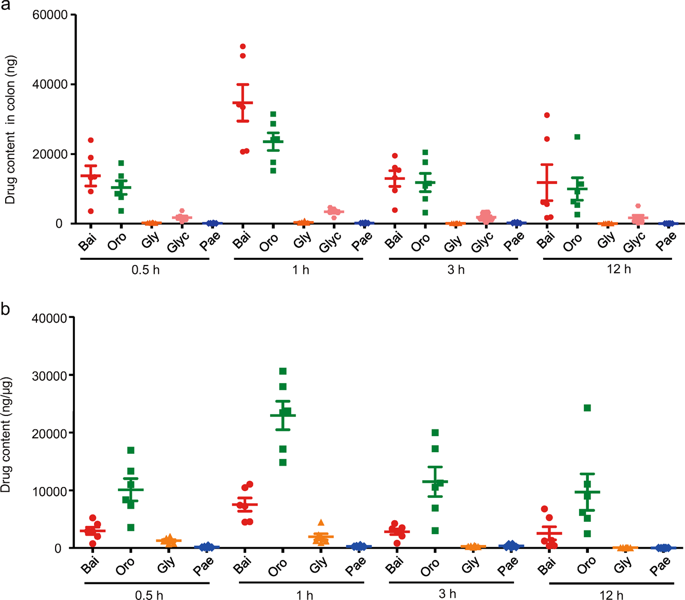Acta Pharmacologica Sinica ( IF 8.2 ) Pub Date : 2020-01-14 , DOI: 10.1038/s41401-019-0335-4 Qi Liu 1 , Rui Zuo 1 , Kai Wang 2 , Fei-Fei Nong 1 , Ya-Jun Fu 1 , Shao-Wei Huang 1 , Zeng-Feng Pan 1 , Yi Zhang 1 , Xia Luo 1 , Xiang-Liang Deng 3 , Xiao-Xue Zhang 4 , Lian Zhou 1 , Yang Chen 1

|
Oroxindin is a flavonoid isolated from the traditional Chinese medicine Huang-Qin, which has shown various pharmacological activities including anti-inflammatory, antitumor, antioxidant, etc. Thus far, the effect of oroxindin on colonic inflammation and the underlying mechanism remain unknown. In this study, we investigated the tissue distribution of oroxindin and its therapeutic effects on ulcerative colitis (UC) as well as the underlying mechanisms. UC model was established in mice by administrating dextran sulfate sodium (DSS) in drinking water for 7 d. We first showed that oroxindin was largely absorbed by the colon as an active ingredient after normal mice received Huang-Qin-Tang, a traditional Chinese medicine decoction. UC mice were then treated with oroxindin (12.5, 25, 50 mg ·kg−1 ·d−1, i.g.) for 10 d. We found that oroxindin treatment greatly suppressed massive macrophages infiltration and attenuated pathological changes in colonic tissue. Furthermore, oroxindin treatment significantly inhibited the generation of IL-1β and IL-18 in the colon via inhibiting the nucleotide-binding oligomerization domain-like receptor 3 (NLRP3) inflammasome formation and activation. In cultured macrophages, LPS induced NLRP3 inflammasome formation and caspase-1 activation, which were suppressed by oroxindin (12.5–50 μM). In LPS-treated macrophages, oroxindin dose-dependently restored the expression of TXNIP protein, leading to suppressing TXNIP-dependent NF-κB activation. In conclusion, these results demonstrate that oroxindin could be absorbed by the colon and attenuate inflammatory responses via inhibiting NLRP3 inflammasome formation and activation, which is related to the inhibitory effect on TXNIP-dependent NF-κB-signaling pathway. Hence, oroxindin has the potential of becoming an effective drug for treating UC.
中文翻译:

Oroxindin 通过抑制 TXNIP 依赖的 NF-κB 通路抑制 DSS 诱导的小鼠溃疡性结肠炎中巨噬细胞 NLRP3 炎症小体的激活
Oroxindin 是从中药黄芩中分离得到的黄酮类化合物,具有抗炎、抗肿瘤、抗氧化等多种药理活性。迄今为止,oroxindin 对结肠炎症的作用及其机制尚不清楚。在这项研究中,我们研究了 oroxindin 的组织分布及其对溃疡性结肠炎 (UC) 的治疗效果及其潜在机制。通过在饮用水中给予葡聚糖硫酸钠(DSS)7天在小鼠中建立UC模型。我们首先表明,在正常小鼠接受黄芩汤(一种中药汤剂)后,oroxindin 作为一种活性成分大部分被结肠吸收。然后用 oroxindin (12.5, 25, 50 mg ·kg -1 ·d -1, ig) 10 天。我们发现 oroxindin 治疗极大地抑制了大量巨噬细胞浸润并减弱了结肠组织的病理变化。此外,oroxindin 治疗通过抑制核苷酸结合寡聚结构域样受体 3 (NLRP3) 炎症小体的形成和激活,显着抑制结肠中 IL-1β 和 IL-18 的产生。在培养的巨噬细胞中,LPS 诱导 NLRP3 炎性小体形成和 caspase-1 活化,这些被 oroxindin (12.5–50 μM) 抑制。在 LPS 处理的巨噬细胞中,oroxindin 剂量依赖性地恢复 TXNIP 蛋白的表达,从而抑制 TXNIP 依赖性 NF-κB 活化。综上所述,这些结果表明,oroxindin 可以被结肠吸收并通过抑制 NLRP3 炎性体的形成和激活来减弱炎症反应,这与对 TXNIP 依赖性 NF-κB 信号通路的抑制作用有关。因此,oroxindin 有可能成为治疗 UC 的有效药物。


























 京公网安备 11010802027423号
京公网安备 11010802027423号